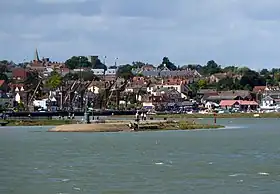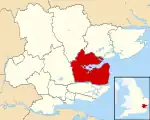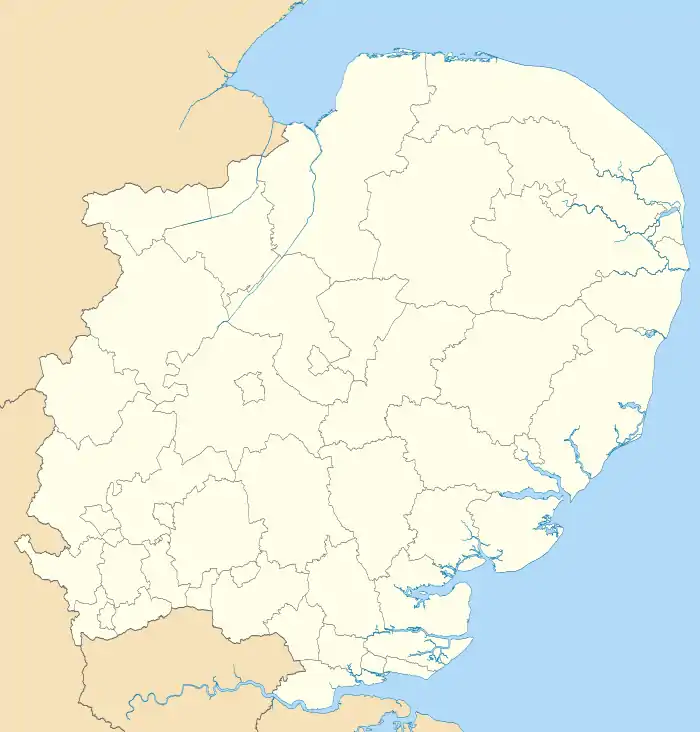Maldon District
Maldon District is a local government district[3][4] in Essex, England. The council is based in the town of Maldon, after which the district is named. The district also includes the town of Burnham-on-Crouch and numerous villages, including Heybridge, Wickham Bishops, Southminster, Tolleshunt D'Arcy and Tollesbury. The district covers the Dengie peninsula in the south, as well as the Thurstable Hundred area to the north of the Blackwater Estuary, a total area of 358.78 km2.[5]

Maldon District | |
|---|---|
 Maldon, the administrative centre of the district | |
 Maldon shown within Essex | |
| Sovereign state | United Kingdom |
| Country | England |
| Region | East of England |
| Non-metropolitan county | Essex |
| Status | Non-metropolitan district |
| Admin HQ | Maldon |
| Founded | 1 April 1974 |
| Government | |
| • Type | Non-metropolitan district council |
| • Body | Maldon District Council |
| • MPs | Priti Patel John Whittingdale |
| Area | |
| • Total | 138.53 sq mi (358.78 km2) |
| • Rank | 99th (of 296) |
| Population (2021) | |
| • Total | 66,627 |
| • Rank | 287th (of 296) |
| • Density | 480/sq mi (190/km2) |
| • Ethnicity | 96.9% White 1.1% S.Asian 2.0% Other |
| Time zone | UTC0 (GMT) |
| • Summer (DST) | UTC+1 (BST) |
| ONS code | 22UK (ONS) E07000074 (GSS) |
| OS grid reference | TL848070 |
Maldon District Council | |
|---|---|
 | |
| Type | |
| Type | |
| Leadership | |
Richard Siddall, Maldon Independents since 8 June 2023 | |
Richard Holmes since August 2018[2] | |
| Structure | |
| Seats | 31 |
Political groups |
|
| Elections | |
Last election | 4 May 2023 |
Next election | 2027 |
| Meeting place | |
 | |
| Council Offices, Princes Road, Maldon, CM9 5DL | |
| Website | |
| www | |
The majority of people live in the small rural villages, many of which have their origins in connections with the coast or agricultural economy. The district has a long association with sailing, as is referenced in the council's logo.

Administrative history
The district was created on 1 April 1974 under the Local Government Act 1972, covering the area of three former districts, which were all abolished at the same time:[6]
- Burnham-on-Crouch Urban District
- Maldon Municipal Borough
- Maldon Rural District
The new district was named Maldon after its largest town.[7]

Governance
Maldon district is a non-metropolitan district, with Maldon District Council forming the middle layer of a three-tier structure of local government. Above the district level, Essex County Council provides county-level services. At the lower level the district is divided into civil parishes.[8]
Political control
The council has been under no overall control since 2020. The council remained under no overall control following the 2023 election.
The first election to Maldon District Council was held in 1973, initially operating as a shadow authority alongside the outgoing authorities until the new arrangements took effect on 1 April 1974. Political control of the council since 1974 has been as follows:[9]
| Party in control | Years | |
|---|---|---|
| No overall control | 1974–1976 | |
| Conservative | 1976–1983 | |
| No overall control | 1983–1999 | |
| Conservative | 1999–2020 | |
| No overall control | 2020–present | |
Leadership
The leaders of the council since 2006 have been:[10]
| Councillor | Party | From | To | |
|---|---|---|---|---|
| Alan Cheshire | Conservative | 2006 | 2008 | |
| Penny Channer | Conservative | 15 May 2008 | 19 May 2011 | |
| John Archer[11] | Conservative | 19 May 2011 | 10 May 2012 | |
| Bob Boyce | Conservative | 10 May 2012 | 21 May 2015 | |
| Miriam Lewis | Conservative | 21 May 2015 | 11 May 2017 | |
| Mark Durham | Conservative | 11 May 2017 | 9 Aug 2018 | |
| Adrian Fluker | Conservative | 9 Aug 2018 | 17 Aug 2020 | |
| Elaine Bamford | Conservative | 1 Oct 2020 | 5 Nov 2020 | |
| Wendy Stamp | Independent | 5 Nov 2020 | 11 Nov 2021 | |
| Penny Channer | Conservative | 18 Jan 2022 | 7 May 2023 | |
| Richard Siddall | Maldon Independents | 8 Jun 2023 | ||
Former leader of Maldon district council John Smith, who led the council between 1991 and 1993, was killed along with two family members while he commanded a light aircraft flight from Oban bound for Andrewsfield, Essex on 9 April 2007.[12][13]
Composition
Following the 2023 election and one subsequent change of allegiance in June 2023, the composition of the council was:[14]
| Party | Councillors | |
|---|---|---|
| Conservative | 9 | |
| Independent | 9 | |
| Liberal Democrats | 6 | |
| Maldon District Independent Group | 6 | |
| Labour | 1 | |
| Total | 31 | |
Of the independent councillors, six form the "District Support Group" and the other three do not belong to a group.[15] The next election is due in 2027.
Premises
The council is based at the Council Offices on Princes Road in Maldon.[16] The original building was previously an orphanage called "The Retreat", which had been purchased in 1939 by the Maldon Rural District Council for £4,500.[17] Large extensions were added in the 1980s to the north and south of the original building.
Elections
Since the last boundary changes in 2003, the council has comprised 31 councillors elected from 17 wards. Elections are held every four years.[18]
The area is part of the parliamentary constituency of Maldon.

History
The first evidence of a settlement to the north of Maldon at Elms Farm is from the Middle Bronze Age 3500 years ago. From 500 BC onwards the red hills of the Crouch and Blackwater show us that there was a continuous and extensive activity in the salt making which still prospers today.
Later, during the Iron Age, about 100 BC, there was a port, set among the marshlands at the junction of the Blackwater and Chelmer rivers. This settlement may have been of regional religious significance, and there is evidence that it traded luxury goods with Europe.
Elms Farm continued as a port and market place but was clearly superseded in importance by Colchester in the 1st century AD, when Colchester became the first capital of the Roman administration.
The Romans founded Othona in the 3rd century. It was a Saxon Shore fort at the mouth of the Blackwater, built to protect the estuary from Saxon pirates. It was here in 654 AD that St Cedd founded the church of St Peter-on-the-Wall, the oldest church in England to retain much of its original fabric.
In 664 AD St Cedd attended the Synod of Whitby which merged the Anglo-Celtic Church with the Church of Rome. Recent changes in the coastline have revealed the remains of extensive Saxon 5-7th century fish traps. The Church stands today overlooking the North Sea from whence came further invaders in the 10th century - the Danes.
In 912 AD and 914 AD King Edward the Elder camped at Maldon to organise defences in the desperate fight against the Danes. In 917 AD the Saxons were defeated at Colchester and besieged at Maldon, but eventually, the Danes were defeated.
In 991 AD there was a major battle between the pillaging Danes led by Olaf Trygvassen who had already attacked Ipswich, and Earl Byrhtnoth’s men who were defending Maldon on the instruction of the Saxon King Æthelred the Unready. Earl Byrhtnoth was in his sixties. The battle was recorded in a poem which is regarded as one of the finest examples of early English literature.
The famous Battle of Maldon took place beside the River Blackwater on 10 August 991, during the reign of Æthelred the Unready. The Anglo-Saxons, led by Byrhtnoth and his thegns, fought against a Viking invasion, a battle which ended in defeat for the Anglo-Saxons.
Geology, landscape and ecology
The district is in the east of Essex (51°41′N 0°45′E). Most of the district is the Dengie peninsula. Still, a significant area is also the area above the Blackwater Estuary, bounded by the River Blackwater to the west until near Kelvedon, the boundary then continues south of Tiptree to the Salcott inlet on the Blackwater Estuary. There are very few settlements on the boundary of the district with the North Sea, in contrast with other coastal districts of Essex, due to the Dengie Marshes.
The district has a rural character ranging from the tidal salt marshes to farmland and rolling wooded ridges. A network of country lanes provides access to the countryside from the towns and villages. A remote area of tidal mud-flats and saltmarshes at the eastern end of the Dengie peninsula forms the Dengie Special Protection Area. The River Blackwater and River Crouch are of international importance for nature conservation particularly for their extensive population of wildfowl and waders.
Parishes
The district is divided into 34 civil parishes. The parish councils of Burnham-on-Crouch and Maldon take the style of "Town Council". Some of the parishes share grouped parish councils, such that there are 31 parish councils. The parishes are:[19]
- Althorne
- Asheldham[lower-alpha 1]
- Bradwell-on-Sea
- Burnham-on-Crouch (Town)
- Cold Norton
- Dengie[lower-alpha 2]
- Goldhanger
- Great Braxted
- Great Totham
- Hazeleigh[lower-alpha 3]
- Heybridge
- Heybridge Basin
- Langford[lower-alpha 4]
- Latchingdon
- Little Braxted
- Little Totham
- Maldon (Town)
- Mayland
- Mundon
- North Fambridge
- Purleigh
- St Lawrence
- Southminster
- Steeple
- Stow Maries
- Tillingham
- Tollesbury
- Tolleshunt D'Arcy
- Tolleshunt Knights
- Tolleshunt Major
- Ulting[lower-alpha 5]
- Wickham Bishops
- Woodham Mortimer[lower-alpha 6]
- Woodham Walter
Arms
 |
|
References
- Shares grouped parish council with Dengie
- Shares grouped parish council with Asheldham
- Shares grouped parish council with Woodham Mortimer
- Shares grouped parish council with Ulting
- Shares grouped parish council with Langford
- Shares grouped parish council with Hazeleigh
- "Council meeting, 18 May 2023". Maldon District Council. Retrieved 19 May 2023.
- "Council minutes, 25 July 2019". Maldon District Council. Retrieved 7 June 2023.
- "Maldon Town Council – Working for You". Retrieved 6 July 2021.
- Council, Maldon District. "Maldon District Council". maldon.gov.uk. Retrieved 6 July 2021.
- "Output Geography". statistics.gov.uk. Archived from the original on 2 January 2007. Retrieved 24 January 2007.
- "The English Non-metropolitan Districts (Definition) Order 1972", legislation.gov.uk, The National Archives, SI 1972/2039, retrieved 19 May 2023
- "The English Non-metropolitan Districts (Names) Order 1973", legislation.gov.uk, The National Archives, SI 1973/551, retrieved 25 April 2023
- "Local Government Act 1972", legislation.gov.uk, The National Archives, 1972 c. 70, retrieved 3 March 2023
- "Maldon". BBC News Online. Retrieved 14 March 2010.
- "Council minutes". Maldon District Council. Retrieved 19 May 2023.
- Forsyth, Jamie (27 May 2011). "New leader vows to steer council through tough times". Maldon Standard. Retrieved 27 May 2022.
- "Air Accident Investigation Web Site". aaib.dft.gov.uk. Archived from the original on 16 July 2012. Retrieved 18 November 2008.
- "John Smith Coroners News Report". news.bbc.co.uk. London. 18 November 2008. Retrieved 18 November 2008.
- "Maldon election result". BBC News. Retrieved 19 May 2023.
- "Council report, 8 June 2023" (PDF). Maldon District Council. Retrieved 9 June 2023.
- "Maldon District Council". Retrieved 7 June 2023.
- "Rural Council purchase The Retreat". Chelmsford Chronicle. 22 September 1939. p. 8. Retrieved 9 June 2023.
- "The District of Maldon (Electoral Changes) Order 2001", legislation.gov.uk, The National Archives, SI 2001/2436, retrieved 19 May 2023
- "Parish councils contact details". Maldon District Council. Retrieved 19 May 2023.
- "East of England Region". Civic Heraldry of England. Retrieved 9 March 2021.
External links
- Maldon District Council[1]
- Burnham-on-Crouch Lifeboat
- Burnham-on-Crouch Weather Station
- Live Weather from Burnham-on-Crouch
- Christian Outreach Centre Heybridge and Maldon - a church meeting in Maldon
- Maldon Town Council[2]
- Council, Maldon District. "Maldon District Council". maldon.gov.uk. Retrieved 6 July 2021.
- "Maldon Town Council – Working for You". Retrieved 6 July 2021.
